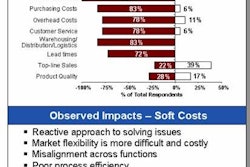Boston — October 20, 2008 — Despite the credit crunch and downturns in the second quarter, total contract value for business processing outsourcing services grew by 28 percent in the 12 months ending September 30, according to a new report from BPO analyst firm NelsonHall.
While the second quarter was not as profitable a quarter for BPO contract signings, there was an overall 13 percent increase in contract signings in commercial and civil government sectors for the first nine months of 2008, the analyst firm reported.
The number of new BPO contracts has arguably continued to decline, but the number of BPO contracts valued at over a $100 million has increased by 21 percent in the last 12 months, and the average value of the top 20-50 deals has increased by 34 percent.
This trend has been at least partly driven by some very large deals in the insurance sector, including the $1 billion contract between WNS and Aviva following the $228 million acquisition of Aviva's captive unit by WNS Global Services and Capita's estimated $350 million contract to deliver Marsh UK's back office administration functions.
The BPO contract value in the "growth economies" grew slightly faster, at 31 percent, than the BPO contract value in the "mature economies," which grew at 28 percent. However, while BPO is becoming increasingly important to support domestic activity in the growth markets, it remains a small portion of overall BPO activity and the growth markets are at this stage predominantly consulting and systems integration markets rather than BPO markets.
The two sectors that usually dominate the contract activity, financial services and government, have increased their share of TCV from 62 percent to 72 percent. However, there has been a significant shift in the balance, with BPO activity in the government sector growing sharply over the past 12-months and overtaking that in the financial services sector. BPO contract activity has increased dramatically at both the federal and state levels in the U.S. and continues to grow in local government in the U.K.
BPO activity in the insurance sector has grown strongly in the past 12 months, accounting for approximately two-thirds of activity in the financial sector, while activity in the banking sector has declined. This can be largely explained by the credit crunch, which has hit the banking sector hardest and earliest. At the moment, the banking sector needs more dramatic remedies than BPO can provide. However, BPO is likely to be an increasing part of the solution in the medium-term, according to NelsonHall.
Front-office and middle-office outsourcing areas have strengthened considerably over the past 12-months, and they now account for 81 percent of BPO contract value. Major front-office BPO contracts are also very prominent, with recent examples including the "USA Contact" and a number of major commercial CMS contracts awarded to vendors such as Convergys and TeleTech.
Elsewhere, the telecom sector has been very active in BPO recently and activity is up in both transportation and healthcare. The manufacturing and retail sectors have recently seen lower levels of BPO activity. These sectors, like the banking sector, have some immediate rethinking of their wider strategies to carry out but, similarly, are likely to turn to greater use of BPO in the medium term once they have addressed any urgent crises.
While the second quarter was not as profitable a quarter for BPO contract signings, there was an overall 13 percent increase in contract signings in commercial and civil government sectors for the first nine months of 2008, the analyst firm reported.
The number of new BPO contracts has arguably continued to decline, but the number of BPO contracts valued at over a $100 million has increased by 21 percent in the last 12 months, and the average value of the top 20-50 deals has increased by 34 percent.
This trend has been at least partly driven by some very large deals in the insurance sector, including the $1 billion contract between WNS and Aviva following the $228 million acquisition of Aviva's captive unit by WNS Global Services and Capita's estimated $350 million contract to deliver Marsh UK's back office administration functions.
The BPO contract value in the "growth economies" grew slightly faster, at 31 percent, than the BPO contract value in the "mature economies," which grew at 28 percent. However, while BPO is becoming increasingly important to support domestic activity in the growth markets, it remains a small portion of overall BPO activity and the growth markets are at this stage predominantly consulting and systems integration markets rather than BPO markets.
The two sectors that usually dominate the contract activity, financial services and government, have increased their share of TCV from 62 percent to 72 percent. However, there has been a significant shift in the balance, with BPO activity in the government sector growing sharply over the past 12-months and overtaking that in the financial services sector. BPO contract activity has increased dramatically at both the federal and state levels in the U.S. and continues to grow in local government in the U.K.
BPO activity in the insurance sector has grown strongly in the past 12 months, accounting for approximately two-thirds of activity in the financial sector, while activity in the banking sector has declined. This can be largely explained by the credit crunch, which has hit the banking sector hardest and earliest. At the moment, the banking sector needs more dramatic remedies than BPO can provide. However, BPO is likely to be an increasing part of the solution in the medium-term, according to NelsonHall.
Front-office and middle-office outsourcing areas have strengthened considerably over the past 12-months, and they now account for 81 percent of BPO contract value. Major front-office BPO contracts are also very prominent, with recent examples including the "USA Contact" and a number of major commercial CMS contracts awarded to vendors such as Convergys and TeleTech.
Elsewhere, the telecom sector has been very active in BPO recently and activity is up in both transportation and healthcare. The manufacturing and retail sectors have recently seen lower levels of BPO activity. These sectors, like the banking sector, have some immediate rethinking of their wider strategies to carry out but, similarly, are likely to turn to greater use of BPO in the medium term once they have addressed any urgent crises.


















